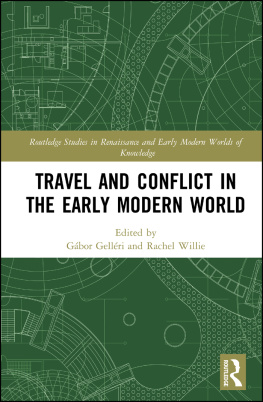GOING FIRST CLASS?
EASA Series
Published in Association with the European Association of Social-Anthropologists (EASA)
Volume 1
Educational Histories of European Social Anthropology
Drackl, D. & Edgar, I. & Schippers, T.
Volume 2
Current Policies and Practices in European Social Anthropology Education
Drackl, D. & Edgar, I.
Volume 3
Grammars of Identity/Alterity: A Structural Approach
Baumann, G. & Gingrich, A.
Volume 4
Multiple Medical Realities: Patients And Healers In Biomedical, Alternative And Traditional Medicine
Johannessen, H. & Lzr, I.
Volume 5
Fracturying Resemblances: Identity and Mimetic Conflict in Melanesia and the West
Harrison, S.
Volume 6
Skilled Visions: Between Apprenticeship and Standards
Grasseni, Cristina (Ed.)
Volume 7
Going First Class? New Approaches to Privileged Travel and Movement
Amit, V.
GOING FIRST CLASS?
New Approaches to Privileged
Travel and Movement
Edited by
Vered Amit
First published in 2007 by
Berghahn Books
www.berghahnbooks.com
2007, 2011 Vered Amit
First ebook edition published in 2012
All rights reserved. Except for the quotation of short passages for the purposes of criticism and review, no part of this book may be reproduced in any form or by any means, electronic or mechanical, including photocopying, recording, or any information storage and retrieval system now known or to be invented, without written permission of the publisher.
Library of Congress Cataloging-in-Publication Data
/ edited by Vered Amit. -- 1st hardback ed.
p. cm. (EASA series ; v. 7)
Includes bibliographical references and index.
ISBN 978-1-84545-196-7 (hbk) -- ISBN 978-0-85745-151-4 (pbk) -- ISBN 978-0-85745-316-7 (ebk)
1. Emigration and immigrationSocial aspectsCase studies. 2. TransnationalismSocial aspectsCase studies. 3. TravelSocial aspectsCase studies. 4. Elite (Social sciences)TravelCase studies.
I. Amit, Vered, 1955-
JV6225.G65 2006
304.8dc22 2006100466
British Library Cataloguing in Publication Data
A catalogue record for this book is available from the British Library.
ISBN 978-1-84545-196-7 (hardback)
ISBN 978-0-85745-151-4 (paperback)
ISBN 978-0-85745-316-7 (ebook)
Contents
Vered Amit |
Sawa Kurotani |
Meike Fechter |
Vered Amit |
Cathy Greenhalgh |
Karen Fog Olwig |
Angela Torresan |
Caroline Oliver |
Margaret C. Rodman |
1
Structures and Dispositions of Travel and Movement
Vered Amit
By design, the title of this collection of essays; Going First Class? New Approaches to Privileged Travel and Movement prompts the question of the type and scope of the privileges that should generally be addressed in comparative studies of spatial mobility and, in particular, by the present case studies. To note in response that privilege is relative is to invoke at one and the same time a tired truism and an open-ended set of analytical complications. Thus one of the central emphases in much of the anthropological literature on elites has concerned the importance of relating the issue of relative advantage and power to particular social and political contexts. As a result, anthropological writings on elites have featured situations that when compared to each other appear to be highly divergent in terms of relative resources, influence, power, and scale. Thus Carol Greenhouses (1983) analysis of elite status concepts among local Baptist, business, and professional networks in a small Georgia suburban town is included in the same anthology as George Marcuss (1983) study of extremely wealthy American family dynasties. Similarly, the cases included in Shore and Nugents compilation (2002) range from mestizo traders in a small rural Peruvian town (Harvey 2002) to the PRI political party machine that governed Mexico for seventy-one years (Gledhill 2002). In other words, anthropologists have dealt with the comparative problems of assessing the general concept of elite by calling upon a flexible notion of the local stretched to accommodate a wide range of organizational levels ranging from villages to nations.
Whatever one might generally make of such an accommodation in a discipline that over the last twenty-five years has made increasing efforts to problematize the local, it is immediately complicated by an ethnographic focus on travel and movement. After all, the mandate of travel, and especially the kind of long-distance travel with which this volume is concerned, is the movement between different locals. Accordingly, many of the chapters in this volume are concerned with the tensions between different hierarchies and criteria of status and privilege as travelers move from one context to another. Highly mobile British cinematographers who work on location around the world bristle at the suggestion that the visual expertise of their French, Polish, or Czech counterparts can provide a more innovative and distinctive product for British producers and directors looking to hone their own competitive advantage (Greenhalgh, this volume). Brazilians arriving in Portugal believed that their professional skills and cultural knowledge could ensure their integration into the Portuguese middle class, but to their surprise they discovered that their influence as well as professional and entrepreneurial success often provoked resentment rather than admiration (Torresan, this volume). The members of a middle-class Jamaican family who had immigrated to the United States worked hard to distinguish themselves from the masses of lower-class Caribbean emigrants with whom they were often identified by members of the receiving society (Olwig, this volume). In Indonesia, their common status as Westerners brings expatriates together with people from a wide variety of socioeconomic backgrounds, people with whom they would not normally have socialized in their home countries. And while Western status unifies as well as segregates, it has not eliminated the significance that still continues to be accorded to distinctions in corporate rank among these expatriates. (Fechter, this volume)
The chapters in this volume deal with very different types of voyaging: occupational journeys, migration, corporate-sponsored expatriacy, life-cycle transition. But they feature certain commonalities of privilege that may well point to broader developments in the global scapes of travel and movement. First, all of the chapters deal with instances of voluntary movement and with people who have the resources -variously of money, time, or credentialsto undertake these journeys. Second, if on a global scale the availability of these resources may demarcate these people as among the worlds relatively affluent, they could not be described as members of its most powerful elites. They surely do not command the kind of resources or influence of the extremely wealthy ethnic Chinese entrepreneurial astronauts participating in the Pacific Shuttle described by Aihwa Ong (1999). Micklethwait and Wooldridge have contended that globalization has encouraged the formation of a cosmocrat ruling elite, although their description of a densely networked set of corporate executives with an almost pathological need to remain in touch, hopping around the world, consuming sea bass from Chile, reading magazines like






